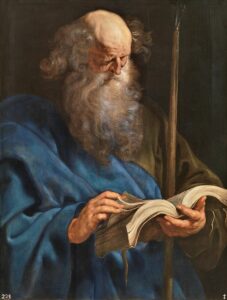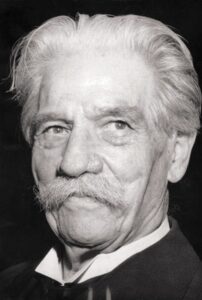Welcome to the Saintly Sixteen! With your help, we have successfully whittled our field from 32 saints to 16. For this round, rather than the basic biographical information, we enter the realm of Quirks and Quotes. Our brilliant Celebrity Bloggers will provide unusual information or legends surrounding their saints along with quotes either by or about their saints.
If you need a quick refresher on those first round battles (and want to look at the initial bios), click the Bracket Tab. Just beneath the bracket, you'll find all the previous matchups sorted by round.
Yesterday, Claire of Assisi snagged the last available Saintly Sixteen by defeating Rafqa of Lebanon 59% to 41%.
Vote now!
Thomas the Apostle
 Thomas is remembered as Jesus’ twin. In some texts, like the Gospel of Thomas, Thomas’ twinness is spiritual – he is Jesus’ spiritual twin and as such has special insight. In other texts, Thomas is Jesus’ twin physically. In one comical scene in The Acts of Thomas, Thomas leaves a room and immediately the risen Christ appears in the room and a man confuses him for Thomas.
Thomas is remembered as Jesus’ twin. In some texts, like the Gospel of Thomas, Thomas’ twinness is spiritual – he is Jesus’ spiritual twin and as such has special insight. In other texts, Thomas is Jesus’ twin physically. In one comical scene in The Acts of Thomas, Thomas leaves a room and immediately the risen Christ appears in the room and a man confuses him for Thomas.
Although Thomas is remembered for his journey to India to proclaim the gospel, Thomas was initially hesitant to go. After Christ told him, “Fear not” and promised him that his grace was with him, Thomas replied, “Send me where you will – but somewhere else!”
Christ then appeared to Abban, a man sent by a king in India to secure a carpenter to build his palace (part of Thomas’ twinness included a facility with wood, apparently). Christ informed Abban that he had a slave who was perfect for the job and sold Thomas to him. The next day the Savior led Thomas to Abban and Abban showed Thomas the deed of sale. Thomas acknowledged that Christ was his “lord” and Abban replied that Thomas had been purchased from him. At this, Thomas prayed, “Send me where you will, Lord Jesus – your will be done!”
Once he arrived in India, he was taken to the king who ultimately left him with a mound of cash to build a palace. After the king left on a long journey, Thomas promptly gave all the money away to those who were poor in the city. The king continued to send Thomas money in installments, all of which Thomas continued to give away to those in need.
Some time later, the king came to check in on the progress of his palace and discovered that Thomas had given all the money away. He locked Thomas up and planned a cruel execution for him. That night, the king’s brother died and was taken to see the magnificent palace in heaven that his brother had unwittingly built with his charity. The brother asked that he be allowed to return and tell his brother of the palace. This was granted and the king set Thomas free when he heard of the glorious abode waiting for him when he died.
Thomas continued traveling around India, where according to some sources, he baptized the Magi who had come to see the baby Jesus. They then helped him in his missionary activity.
There are different accounts of Thomas’ death. In one he converted the wife of the cousin of a king after which she “shunned her husband’s bed with horror.” When the king sent his wife to try to convince her to recant, she too was converted and would no longer sleep with the king.
In a rage, the king arrested Thomas and tried to torture him in various ways, none of which were successful. Finally, in an Elijah-esque duel, Thomas cast a demon out of an idol. At Thomas’ command, the demon then melted the idol “like wax.” The high priest, furious at Thomas, and wishing to avenge his god, impaled him with a sword. Centuries later, Thomas’ remains were returned to Syria.
Albert Schweitzer
 If Albert Schweitzer had written “The Quest for the Holy Jesus” as a role-playing game (RPG), then Albert would be a tenth level cleric with healing capabilities (going for the geek vote here). In fact, like any good cleric, Albert was wise and spent his life sharing his knowledge, love, and wisdom of God and life through writing and action. He spent his life in the quest for Jesus.
If Albert Schweitzer had written “The Quest for the Holy Jesus” as a role-playing game (RPG), then Albert would be a tenth level cleric with healing capabilities (going for the geek vote here). In fact, like any good cleric, Albert was wise and spent his life sharing his knowledge, love, and wisdom of God and life through writing and action. He spent his life in the quest for Jesus.
Like any good cleric, Albert was a fan of bards and cats (going for the cat and music people vote) saying, “There are two means of refuge from the misery of life — music and cats.” And was an avid member of PETA (if PETA were around then), “We must fight against the spirit of unconscious cruelty with which we treat the animals. Animals suffer as much as we do. True humanity does not allow us to impose such sufferings on them. It is our duty to make the whole world recognize it.” But these messages and teachings from Albert, were rooted in a search for what it means to love like Jesus.
In a world of war, disease, and misery, Albert brings a message of kindness and healing to those suffering around him, “Until he extends the circle of his compassion to all living things, man will not himself find peace.”
And Albert knows that the clerics in life are the ones who bring the light to dark places, “At times our own light goes out and is rekindled by a spark from another person. Each of us has cause to think with deep gratitude of those who have lighted the flame within us” (y’all gamers know that the cleric always carries the torch). He calls us to be that light for each other in our Quest to Find Jesus.
But unlike a truly savvy gamer who knows that the secular quest is about rolling better dice and getting critical hits, Albert teaches, and alternate way of living by way of entering the journey, both good and bad and trusting in God: “Eventually all things fall into place. Until then, laugh at the confusion, live for the moments, and know EVERYTHING HAPPENS FOR A REASON.”
Albert knows that the only way to win the game of life is love. He teaches us that love is the greatest healing potion of them all. And he knows that we all win the Quest for the Holy Jesus when we choose love. “The only thing of importance, when we depart, will be the traces of love we have left behind.”
Give thanks (and your vote) for the witness of Albert in the world today. His witness provided a map for all of us to follow in the quest before us.
— Anna Courie
85 comments on “Thomas the Apostle vs. Albert Schweitzer”
This is the toughest match for me yet, so I just voted for both on different devices!
Felt compelled to add my thoughts on "everything happens for a reason" (regardless of who actually said it). It is indeed a horrible thing to say to another who is suffering. It is a flimsy thought better suited to internet memes than serious theology. And yet...many people I know and respect who have suffered greatly have said some version of this. Maybe when it is an experience of one's own, an experience of finding meaning in spite of the chaos of the world and its cruelty, then it is as true as Julian's "all shall be well". Does that make sense?
Christ sold his twin as a slave?
Am i missing something? Even as x allegory i can't handle this.
Voting for albert.
I'm sorry, I'm still baffled at this so I'm double posting.
If a right-wing person says something like, Black people are lazy; they are naturally suited for menial labor and have to be coerced into working;they should not rise above their station and get educated...they will get run over by the cancel bus and rightly so.
If a liberal hero says this precise thing, it's often brushed off as an unfortunate anachronistic mistake that has nothing to do with their theology.
But here's the deal. The historical critical method, the act of asking "Did God really say...(cf the serpent in the garden)," the divorce of the Jesus of History from the Christ of Faith...this set of theological moves has been used many times to ratify and endorse horrific political projects. The theological position and the racial hierarchies go together - in a formal sense. It's all part of one package.